Social media has become an integral part of our daily lives, with billions of people around the world using platforms such as Facebook, Instagram, Twitter, and TikTok to connect with others, share information, and express themselves. While social media offers many benefits, including increased communication and access to information, research has shown that it can also have a significant impact on mental health. In this article, we will explore the ways in which social media affects mental health and discuss strategies for maintaining a healthy balance.
The Rise of Social Media
In the past decade, social media has exploded in popularity, with platforms like Facebook and Instagram boasting billions of users worldwide. The allure of social media lies in its ability to connect people across vast distances, allow them to share their thoughts and experiences, and keep up with the latest trends and news. However, the constant stream of information and images can have unintended consequences for mental health.
Comparison and Self-Esteem
One of the most significant impacts of social media on mental health is the phenomenon of comparison. Users often compare themselves to others based on the carefully curated posts they see on their feeds, leading to feelings of inadequacy and low self-esteem. Research has shown that spending excessive time on social media can contribute to symptoms of depression and anxiety, as individuals feel pressure to live up to the unrealistic standards set by influencers and celebrities.
- According to a study published in the Journal of Social and Clinical Psychology, researchers found that using social media platforms like Instagram can increase feelings of loneliness and poor body image, particularly among young adults.
- In a survey conducted by the Royal Society for Public Health in the UK, Instagram was ranked as the worst social media platform for mental health, with users reporting feelings of anxiety, depression, and FOMO (fear of missing out).
Cyberbullying and Online Harassment
Another negative impact of social media on mental health is the prevalence of cyberbullying and online harassment. With the anonymity afforded by the internet, individuals may feel emboldened to engage in hurtful behavior towards others, leading to feelings of shame, guilt, and isolation. Cyberbullying has been linked to increased rates of depression, anxiety, and suicidal ideation, particularly among young people who are more vulnerable to online attacks.
- According to a report by the National Institute of Mental Health, victims of cyberbullying are at higher risk of experiencing mental health issues such as depression, anxiety, and post-traumatic stress disorder.
- In a study published in the journal JAMA Pediatrics, researchers found that adolescents who experienced cyberbullying were more likely to report self-harm behaviors and suicidal thoughts compared to those who did not experience online harassment.
Impacts on Sleep and Well-Being
In addition to its effects on self-esteem and emotional well-being, social media can also disrupt sleep patterns and overall mental health. The blue light emitted by screens can interfere with the production of melatonin, a hormone that regulates sleep, leading to insomnia and poor sleep quality. Furthermore, the constant notifications and alerts from social media can increase stress levels and contribute to feelings of overwhelm and burnout.
- A study published in the journal BMC Public Health found that adolescents who spent more time on social media had higher rates of insomnia and sleep disturbances compared to those who limited their screen time.
- Research conducted by the American Psychological Association revealed that frequent social media use is associated with higher levels of stress, anxiety, and depression, particularly among young adults who feel pressured to be constantly connected and responsive.
Maintaining a Healthy Balance
Despite the negative impacts of social media on mental health, there are ways to mitigate its effects and maintain a healthy balance. By setting boundaries around social media use, engaging in activities that promote well-being, and seeking support from friends and family, individuals can reduce the negative impact of social media on their mental health. Additionally, practicing mindfulness and self-care can help individuals cultivate a sense of self-worth and resilience in the face of social media pressures.
- Limit screen time by setting specific hours for social media use and avoiding checking platforms before bed or first thing in the morning.
- Foster real-life connections by spending time with friends and family in person, engaging in hobbies and activities that bring joy, and prioritizing face-to-face interactions over virtual communication.
- Practice self-compassion by acknowledging the negative effects of social media on mental health and taking steps to protect your well-being, such as unfollowing accounts that trigger feelings of comparison or inadequacy.
Conclusion
Social media has revolutionized the way we connect and communicate, but it also comes with risks to mental health. From comparison and self-esteem issues to cyberbullying and sleep disturbances, the negative impacts of social media on mental health are well-documented. By being aware of these risks and implementing strategies to protect our well-being, we can enjoy the benefits of social media while minimizing its negative effects. Remember, your mental health is precious – prioritize self-care and seek support when needed.
